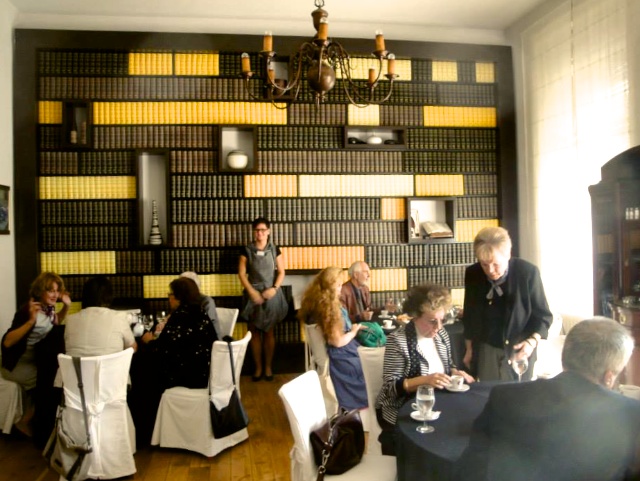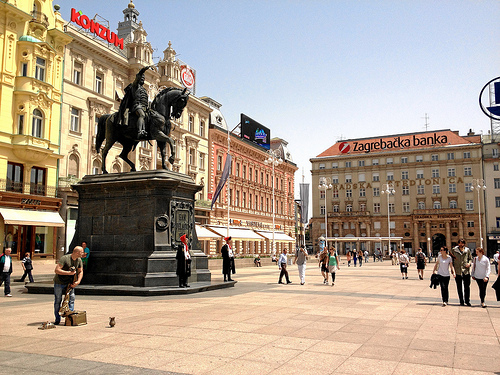“Next stop… Ban Josip Jelačić Square”.
I stepped out of the number 17 tram—overcrowded as usual—into what would prove one of the most enjoyable and illuminating Friday mornings I have had in a long while. I made my way toward my destination past the square’s two most familiar inhabitants—the statue of Ban Jelačić on horseback, and the ubiquitous Golden Mummy, a living statue street performer who has become a true symbol of Zagreb’s main square.
The Croatian Writers Association is a venue I had visited only once before, on a non-literary adventure with a friend that, to make a long story short, involved crashing a formal party, being asked to leave, and a dirty glass ashtray, stolen in anger. On this particular Friday morning, however, the beautifully decorated turn-of-the-century interior of the building inspired a sense of humility and respect, a sense that would only grow deeper with every panel I attended.
One of the aspects of the conference that impressed me the most as I sat in the back, furiously taking notes, was the incredible interdisciplinary scope that the speakers, as well as members of the audience, covered in the presentations and the ensuing discussions about the “Croatian Giants of Translation and World Literature”, the official theme of the Meeting. The conference hall was far from packed throughout the day, and yet there was enough experience and intellect present to fill ten conference halls, all the way up to the high Art Noveau ceiling.
The first speaker of the day, Vojan Lukatela, analysed Tin Ujević’s translations of Joseph Conrad’s work to great detail. Surprisingly, it seems that while he was indeed one of our greatest modern poets, Ujević was actually a very poor translator who often completely misunderstood the simplest of English phrases, and who used only the most basic vocabulary in his translation work (for example, he translated all of Conrad’s water craft–“canoes”, “barques”, “schooners”, “clippers”, or “brigantines” as “lađa”, which simply means “boat”). A woman in the audience later managed to contextualise this disparity between his great art and his subpar translation work by reminding us all that that we should not evaluate Ujević’s translations from an artistic point of view, as he, a true bohemian, frequently took on translation jobs just as a means of getting by, a common practice for modernist Croatian writers.

Courtesy of Zagreb Translators Meeting, 2013
Lukatela’s co-panelist, Simona Delić, considered the translation work of Olinko Delorko, who mostly translated Spanish authors, namely Federico Garcia Lorca. I found her paper fascinating for its integrative quality, as it viewed Delorko’s work from the perspective of translation studies, comparative literature and ethnology, Delorko’s primary area of expertise. Her analysis was simultaneously a linguistic analysis, a study of influence, and an examination of the ethnographic value of Delorko’s work. Another presentation of ethnographic, but also artistic, importance was Katja Radoš Perković’s paper on Frano Čale, a literary historian and translator whose translations of Goldoni’s theatre into the dialect of Dubrovnik teeter between expert literary translation and creative adaptation, and encapsulate the Dubrovnik dialect to form a piece of true ethnographic significance.
From the perspective of cultural studies and history of literature, a remarkable paper was given by Nina Aleksandrov Pogačnik, whose presentation, entitled “Frangeš’s De Sanctis, (a Homage to a Translation),” evaluated the ways in which De Sanctis’ Storia della letteratura italiana helped shape a notion of a unified Italian national literature. Ivo Frangeš’ translated De Sanctis, and his subsequent writing of Povijest hrvatske književnosti (The History of Croatian Literature), was heavily influenced by De Sanctis’ work. This book was crucial in helping to shape the Croatian sense of our own national literature. The academic work of Ivo Frangeš, a legend of Croatian studies, marked a new era of contemporary Croatian literature, and it is unquestionable that this transition was facilitated by the art of translation.
The moderator for the event was Sead Muhamedagić, an award-winning translator and author of extraordinary erudition and amiability. He maintained and consistently repeated the mantra that “a meeting is always an exchange of values”, and this idea stayed with us throughout the day as we mingled over coffee and lunch in the traditional, leisurely Balkan style.
I left no. 7/1 Ban Jelačić Square that afternoon with renewed respect for the art of literary translation and the impeccable tradition it has maintained in Croatia over the centuries. The geo-political position of my small country, coupled with its diligent care for the Croatian language, has made translation a traditionally indispensable national skill. Going back as far as 1580 AD, Croatian culture was already enriched by the translations of Dominko Zlatarić, whose translation of Torquato Tasso’s Aminta was already available in Croatian, even before it was published in the original Italian. Dominko Zlatarić was also the first European translator of Sophocles, placing Croatia at the forefront of the European Renaissance. Through the art of literary translation Croatia stayed current with the development of European literature, creating works of art that were heavily influenced by European authors, but were also relevant representatives of any given period in their own right. A great example of this is the Croatian poet and translator of the Enlightenment period, Fran Krsto Frankopan, whose translation of Moliere’s was the first into any European language. What made this even more remarkable was that he did this from an Austrian prison cell, awaiting his execution after being convicted for high treason against the Austro-Hungarian Empire.
The 7th Zagreb Translators Meeting was enough to convince me that this powerful tradition of literary translation is still alive today, and it is why I will definitely be attending the next Zagreb Translators Meeting, in 2015.
Top CC image courtesy of Thomas Gómez, Flickr
Image courtesy of Zagreb Translators Meeting

